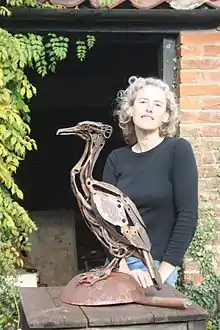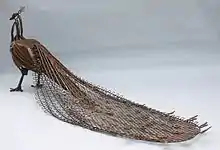Harriet Mead
Harriet Rebecca Mead (born 2 September 1969) is an English wildlife artist specialising in metal sculptures.[1]
Harriet Mead | |
|---|---|
 | |
| Born | 2 September 1969 Tring, England |
| Nationality | British |
| Education | St Albans College, Norwich School of Art |
| Known for | Wildlife art, installation art, sculpture |
Notable work | Suffolk Trinity |
| Awards | Capmark Wildlife Award 2007 |
Mead's work is inspired by animals and birds. From an early age she was encouraged to observe and develop a keen interest in British wildlife due to the influence of her late father, Chris Mead,[2] who was a well-known author and broadcaster. She uses personal experiences and direct observation to provide inspiration for her work. The countryside and wildlife around her home in Hilborough in rural Norfolk and her travels in Asia and Africa, provide subject matter for her work. She received formal art education during a foundation year at St Albans College, followed by a degree in Fine Art at the Norwich School of Art.[3]
After showing at its annual show for several years, Mead was elected a full member of the Society of Wildlife Artists, SWLA. In 2004, she was elected to Council of the SWLA and won the Society's Capmark Award in 2007 and was runner-up in 2006.[4][5] In 2009, she was elected as the Society's President, making her the youngest and first woman to hold the post in the Society's 47-year history.
Her work

Although predominately a sculptor, Mead also produces drawings and prints, but focuses on using steel to create her sculptures. Her steel sculptures fall into two categories;- the "true-to-life" form made predominantly from sheet steel that resemble as accurately as possible the species being created, and "found objects" in which Mead uses everyday objects to produce an abstract form of the animal.
Mead tends to work to commission, but does maintain a few examples of her work in key galleries.[6] She seems to be able to tackle any subject from the natural world.
Art and conservation

Mead has used her art to promote and raise funds for conservation and animal charities. Most notably amongst the organisations she has supported are the Game and Wildlife Conservation Trust, the Countryside Education Foundation[7][8] and the Suffolk Horse Society.[9][10] Together with other leading international wildlife artists Mead has taken part in two Artists for Nature Foundation[11][12] projects, which bring artists together to promote and raise funds for conservation projects around the world, including the Great Fen Project in Cambridgeshire, and the Hula Valley in Israel.
Public art

Mead has produced two large-scale public art pieces. One is the Suffolk Trinity[13] which includes a life-size Suffolk Punch horse, a Suffolk Ram and a Suffolk Redpoll Bull providing an impressive feature at the entrance of Trinity Park (the Suffolk show ground), near Ipswich. The other is a life-size heavy horse being led by a man at Dromore, West Tyrone, Northern Ireland.[14]
Further reading
- The Great Fen (Artists for Nature in England) by Chris Gerrard, Langford Press, Peterborough (2007) ISBN 1-904078-13-3
- Drawing Inspiration from the Hula Valley (Artists for Nature in Israel) by Zev Labinger & Edna Gorney, SPNI, Tel Aviv (2011) ISBN 978-965-371-011-5
- Art for the Love of Sark, A contemporary portrait of a changing Island by Renate Zoller, Gateway Publishing, Sark (2012) ISBN 978-190-247-109-9
References
- "Chris Mead". The Guardian. Retrieved 21 January 2017.
- "Harriet Mead, Sculptors | Pinkfoot Gallery, Cley Norfolk". www.pinkfootgallery.co.uk. Retrieved 31 May 2019.
- "MAKING A MARK". makingamark.blogspot.com.
- "Artdaily.org - The First Art Newspaper on the Net". artdaily.org.
- "Just another WordPress site". Countryside Foundation. 20 June 2014. Retrieved 21 January 2017.
- "Suffolk Horse Society". Suffolk Horse Society.
- Cathy Comerford (26 September 2015). "Equestrian news from Horse & Hound". Horse & Hound.
- "Artists for Nature Foundation". artistsfornature.com.
- Kenneth Allen. "The Dromore ploughman (C) Kenneth Allen :: Geograph Britain and Ireland". geograph.org.uk.